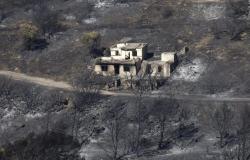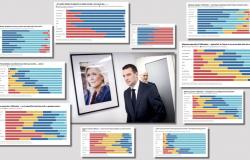The Reconquest party! unveiled its slogan for the legislative elections: “The courage of the truth”. An expression popularized by a philosopher who would today be one of the sworn enemies ofEric Zemmour, Michel Foucault. Lighting.
“The courage of the truth” : this is the campaign slogan chosen by the far-right candidate Eric Zemmour for the legislative elections. A choice that raises questions. We did not expect, in fact, to see the president of Reconquest! take over a formula widely popularized by… Michel Foucault (1926-1984), philosopher of post-modernity hated by the polemicist, critic of disciplinary structures and tutelary figure of struggles queer contemporary.
“The courage of truth” is the title of the last course held by Foucault at the Collège de France in 1984. It is closely linked to another notion, the parrhesia (Or parrhesia, παρρησία), THE ” say true “ : the fact of verbalizing not necessarily a truth which would be perfectly, rationally established, but a visceral conviction. In these cases we say what we think deep within ourselves (Foucault speaks of “veridiction”). “Parrhesia is […] the courage of the truth in those who speak and take the risk of saying, despite everything, all the truth that they think, but it is also the courage of the interlocutor who accepts to receive as true the hurtful truth that ‘he hears. »
“Parrhesia” and rhetoric
As Foucault points out, in the ancient world, the parrhesia is distinguished from another major form of speech: rhetorical speech. There parrhesia has something spontaneous, urgent, rough-hewn. It disturbs, inconveniences and disrupts agreed practices. Rhetoric, on the contrary, is an art: it is a word worked to seduce or convince. “Schematically, we can say that rhetoric […] East a technique, a set of processes which allow the speaker to say something which is perhaps not at all what he thinks, but which will have the effect of producing on him [à] Who [il s’adresse] a certain number of convictions, which will induce a certain number of behaviors, which will establish a certain number of beliefs. In other words, rhetoric does not imply any link of the order of belief between the one who speaks and what he [énonce]. »
On the contrary, the parrhesia implies an intimate conviction, a strong link between what is said and the person who says it. We may wonder on which side of this first dichotomy stands Éric Zemmour, a skilled orator very familiar with the rules of the public speaking space. If it seems difficult to doubt the convictions he expresses, they are clearly taken up in a rhetoric which incorporates, particularly since Zemmour entered politics, obvious elements of language.
The three forms of courage
After this first opposition, Foucault establishes a typology of three very distinct forms taken by the “courage of truth”.
- There parrhesia policy. It is the most historic figure: that of the man who, despite all the risks, including at the risk of his own life, tells the sovereign, the powerful, the elites the disturbing truths that they do not want. see. Foucault speaks of “political boldness” or “political bravery” : “Either the courage of the democrat, or even the bravery of the courtier, which say, either to the Assembly in the case of the democrat, or to the Prince in the case of the courtier, something other than what this Assembly or this Prince thinks . […] It is against the opinion of this Prince or this Assembly, and it is for the truth that the politician, if he is courageous, risks his life. » It is undoubtedly with this figure that Zemmour tries to identify himself: he claims to take on, for more than a decade, the role of the one who, despite reproaches and attacks, repeats supposedly established truths – on immigration , insecurity, Islam, etc. – in a public space that would not want to hear them. However, things have changed over the years. The media space, restructured in particular by the interference of Vincent Bolloré who largely shares Zemmour’s political orientation, is no longer so hostile to these speeches.
- The concern of the soul. It is represented, paradigmatically, by the“Socratic irony”, “which consists of making people say, and gradually making them recognize that what they say they know, what they think they know, in fact they do not know. In this case, Socratic irony consists of risking, on the part of people, anger, irritation, revenge, even trial, to lead them, in spite of themselves, to care about them themselves, their soul and the truth. » This parrhesia ethics is therefore coupled with the central theme of “care of the soul” : Socrates dares to deconstruct the unfounded but deeply rooted beliefs of others to free them from the tyranny of opinion which hinders the exercise of the best part of themselves, the intellect. He has the “courage to tell the truth to those we want to help and direct in the ethical formation of themselves”. For Foucault, this is a form of courage for the truth “that we must not expose ourselves to the danger of politics, both because it has a completely different form, because it is incompatible with the platform and the forms of rhetoric specific to political discourse, and because, ‘on the other hand, she would risk being reduced to silence.’ Zemmour seems to have remained quite distant from her.
- The cynical scandal. Here, it is the speaker’s own life that is exposed for what it is. “In the first two cases, the courage of the truth consists of risking one’s life by telling the truth, of risking one’s life to tell the truth, of risking one’s life because one speaks it. In the case of the cynical scandal […] we risk our lives, not simply by telling the truth, for the sake of telling it, but by the very way in which we live. » Diogenes is the paradigmatic figure of this attitude: to the hypocritical game of “rules, conventions, customs and habits” artificial elements of which social life is woven, he opposes through his way of life the scandalous truth of the animal nature of man. He has “the courage to manifest the truth about oneself against all odds”, “the insolent courage to show oneself as it is”. This sense of courage for the truth obviously does not apply to Zemmour, who overall leads a very “normal” life. On the contrary, it is illustrated today by all those who affirm and display protesting forms of life in a standardized public space – we particularly think of the question of the “visibility” of LGBT+ existences which Zemmour would, on the contrary, want to remain invisible .
“Listening truly” to better face the truth
Let us remember what Foucault said: “The courage of the interlocutor who accepts to receive as true the hurtful truth he hears. » It is perhaps here that the essential movement of the parrhesia : in the ability to question oneself, to doubt, to hesitate – rather than in the fact of asserting one’s own point of view to the other. Foucault suggests this in a few passages. There is, he says, “another aspect which is that of the courage of the truth: what type of resolution, what type of will, what type not only of sacrifice but of combat are we capable of facing to arrive at the truth? »
Does Zemmour have this courage? This courage to be disturbed, embarrassed, disturbed in one’s certainties and evidence by the other without dismissing and obliterating one’s “true statement”? It is permissible to doubt this, from a man who constantly repeats the same formulas, the same images of decline, in an ideological closure that he readily reproaches his adversaries. No doubt it is possible that Zemmour is largely convinced of the fantasies he stirs up – that he really has the feeling of “speaking the truth” when he rails against the decline of France which distresses him and makes repeated assertions times deconstructed (on the “great replacement”, for example). But saying one’s conviction whatever the cost is not worth much, as Foucault points out, if it goes without a “listen true”without an ability to receive the ” say true “ of others. Wouldn’t the real courage of truth be, in these conditions, for someone like Zemmour, to make room for truths that are paradoxically more difficult than all the decadentist obsessions: to hear that everything is not so bad, that is not everything to be thrown away in Modernity?
Expresso: interactive courses
My friends, my loves…
Can our love also be our friend (and vice versa)? Vast question, which invites us to analyze the role of friendship in romantic relationships.






